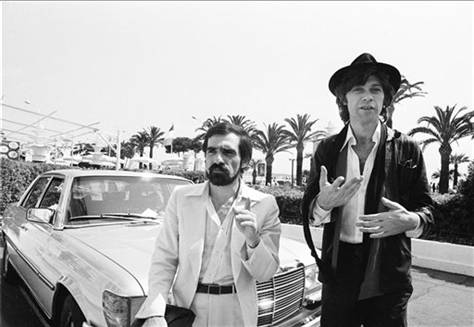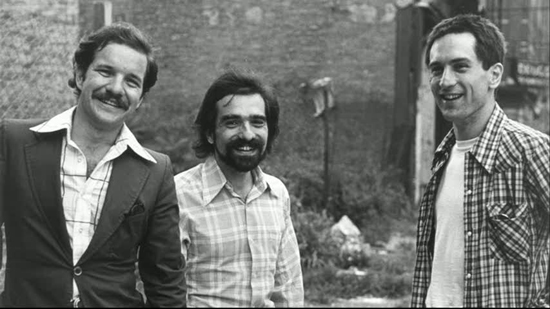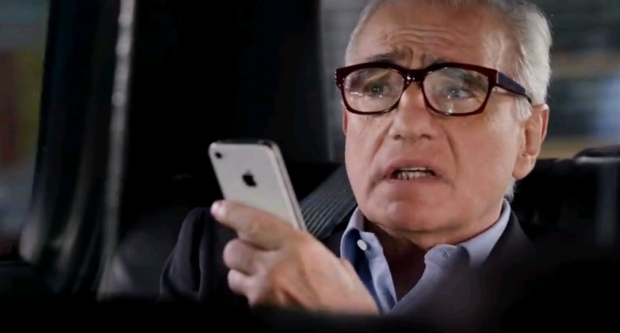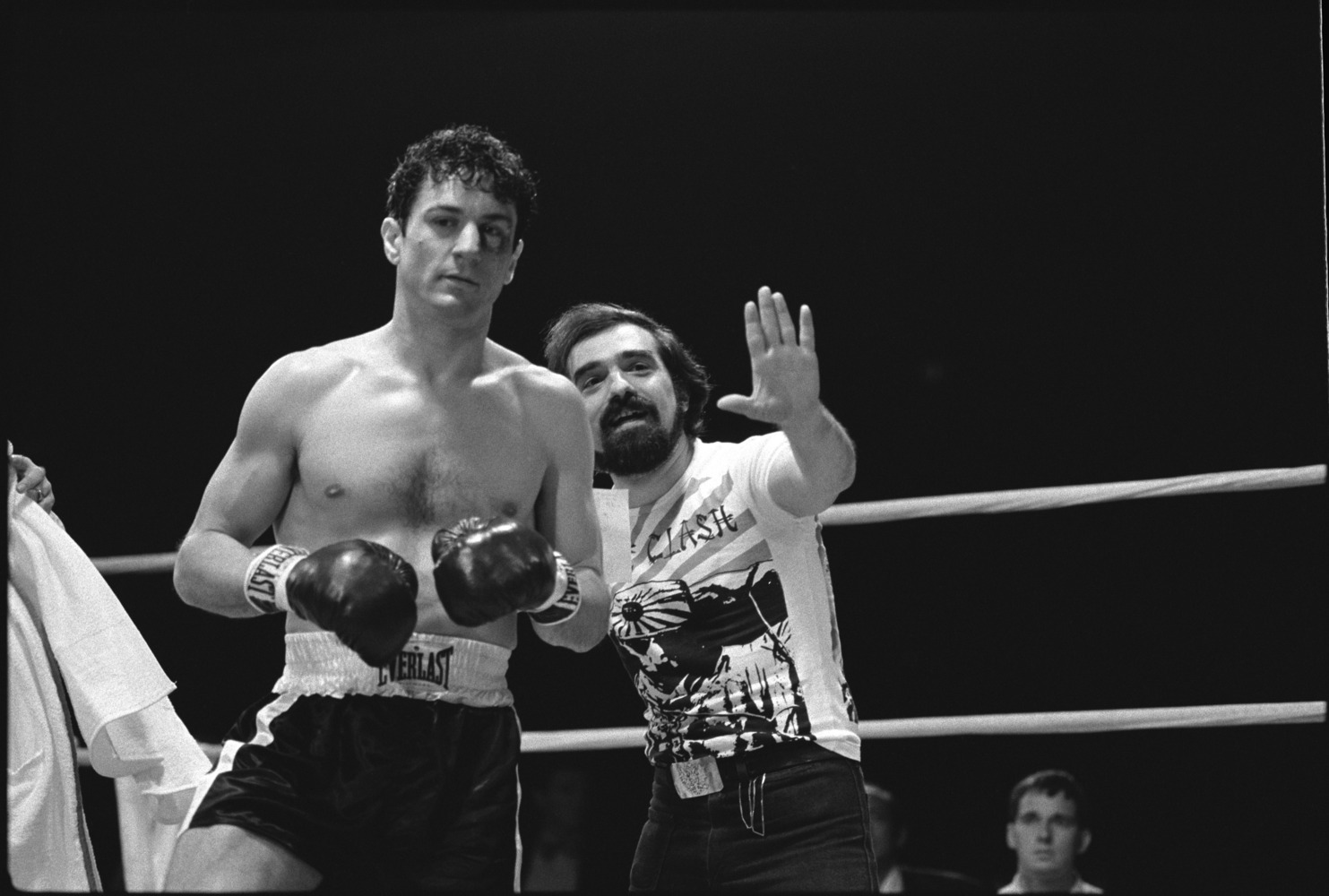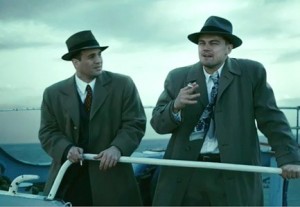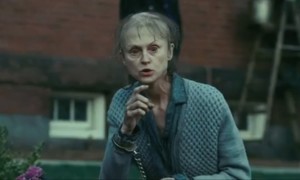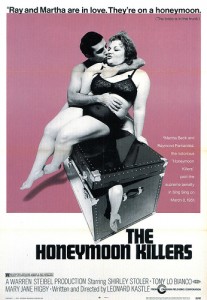In 1978, Robbie Robertson and Martin Scorsese discuss the making of The Last Waltz, perhaps the best concert film ever. Little known fact: The movie’s cocaine wrangler was nominated for three Golden Globes.
You are currently browsing articles tagged Martin Scorsese.
Tags: Martin Scorsese, Robbie Robertson
Here, in no particular order, are this year’s 20 selections. These pieces, which made me think or reconsider my opinions or just delighted me, are limited to ungated material that’s only a click away. (I included work from publications such as the New York Times which allow a certain amount of free articles per month.)
- “The Reality Show” (Mike Jay, Aeon) Brilliant essay that points out that the manifestations of mental illness are heavily influenced by the prevailing culture. In our case: ubiquitous technology.
- “Invisible Child–Girl in the Shadows: Dasani’s Homeless Life“ (Andrea Elliott, New York Times) A tale of two cities in present-day New York told through the story of a talented grade-school girl trying to make it through the hard knocks of class divisions. What’s expressed tacitly is that if the best and brightest homeless children only have a so-so shot at success, those less gifted have almost none.
- “The Robots Are Here” (Tyler Cowen, Politico Magazine): The best distillation yet of the economist’s ideas about where the technological disruption will lead us as a society. I’m not completely on board with his forecasting, but this article is smart and provocative.
- “In Conversation: Antonin Scalia” (Jennifer Senior, New York) Amazing interview with the Supreme Court Justice which reveals him to a stunning, and frightening, extent.
- “Return of the Oppressed“ (Peter Turchin, Aeon) The father of Cliodynanics forecasts a dark future for humanity thanks to spiraling wealth inequality.
- “There Are Now Two Americas. My Country Is a Horror Show.” (David Simon, The Guardian) In an article adapted from an impassioned speech, the humanist TV creator levels the way we live now, in a time when many with money think that corporations are people.
- “Omens“ (Ross Andersen, Aeon) With a focus on philosopher Nick Bostrom, the writer wonders whether humans will survive into the deep future.
- “Thanksgiving in Mongolia” (Ariel Levy, The New Yorker) Heartrending story of a reporter’s loss in a far-flung place is personal journalism at its finest.
- “Blockbuster Video: 1985-2013” (Alex Pappademas, Grantland): A master of the postmortem lays to rest not a person but a way of life which is disappearing brick by brick and mortar by mortar.
- “The Corporate Mystique” (Judith Shulevitz, The New Republic) A reminder that a female CEO is not a replacement for a women’s movement.
- “The Global Swarm” (P.W. Singer, Foreign Policy) The author considers privacy as drones get smaller, smarter and seemingly unstoppable.
- “The Master” (Marc Fisher, The New Yorker) A profile of a predatory teacher is most interesting as an extreme psychological portrait of the cult mentality.
- “The Professor, the Bikini Model and the Suitcase Full of Trouble” (Maxine Swann, New York Times Magazine) Twisty tale of a lonely physicist lured by longing into a web of crime.
- “A Practical Utopian’s Guide to the Coming Collapse“ (David Graeber, The Baffler) The anthropologist and activist opines on conventional wisdom, the status quo and revolutions.
- “Why the World Faces Climate Chaos” (Martin Wolf, Financial Times) An attempt to understand why we cling to systems that doom us, that could make us the new dinosaurs.
- “The Hollywood Fast Life of Stalker Sarah” (Molly Knight, New York Times Magazine) Thoughtful article about celebrity in our age of decentralized media, in which fame has entered its long-tail phase, seemingly available to everyone and worth less than ever.
- “Connecting the Dots, Missing the Story” (Evgeny Morozov, Slate) An argument that Big Data’s predictive abilities obscure underlying meanings.
- “Academy Fight Song” (Thomas Frank, The Baffler) The author plays the role of designated mourner for common sense in U.S. higher education, which costs more now and returns less.
- “The Wastefulness of Automation” (Frances Coppola, Pieria) A smart consideration of the disconnect of free-market societies that are also highly automated ones.
- “The Persisting Vision: Reading the Language of Cinema” (Martin Scorsese, New York Review of Books) The filmmaker’s essay about his enduring love affair with cinema points out that we need to redefine the meaning of literacy.
Tags: Alex Pappademas, Andrea Elliott, Ariel Levy, David Graeber, David Simon, Evgeny Morozov, Frances Coppola, Jennifer Senior, Judith Shulevitz, Marc Fisher, Martin Scorsese, Martin Wolf, Maxine Swann, Mike Jay, Molly Knight, P.W. Singer, Peter Turchin, Ross Andersen, Thomas Frank, Tyler Cowen
Paul Schrader, Hollywood poet of the American underbelly, which often hides in plain sight, just did an Ask Me Anything at Reddit to promote his new film, The Canyons. A few exchanges follow.
___________________________
Question:
Any insights about John Hinckley and the Reagan assassination attempt? What was your reaction and those of other people involved with Taxi Driver?
Paul Schrader:
I was scouting locations for Cat People when the news came over the radio. I said to the driver, it’s one of those Taxi Driver kids. When I got back to the hotel, the FBI was waiting for me because Hinckley had mentioned the film. They wanted to know if he had tried to contact me. This is a very thorny moral question. My feeling is that if you censor art you will lose Crime and Punishment but you will still have Raskolnikov. But I also feel that there is a level of moral responsibility as well.
In a New York Review of Books essay, Martin Scorsese sums up the new literacy:
“Now we take reading and writing for granted but the same kinds of questions are coming up around moving images: Are they harming us? Are they causing us to abandon written language?
We’re face to face with images all the time in a way that we never have been before. And that’s why I believe we need to stress visual literacy in our schools. Young people need to understand that not all images are there to be consumed like fast food and then forgotten—we need to educate them to understand the difference between moving images that engage their humanity and their intelligence, and moving images that are just selling them something.
As Steve Apkon, the film producer and founder of the Jacob Burns Film Center in Pleasantville, New York, points out in his new book The Age of the Image, the distinction between verbal and visual literacy needs to be done away with, along with the tired old arguments about the word and the image and which is more important. They’re both important. They’re both fundamental. Both take us back to the core of who we are.
When you look at ancient writing, words and images are almost indistinguishable. In fact, words are images, they’re symbols. Written Chinese and Japanese still seem like pictographic languages. And at a certain point—exactly when is ‘unfathomable’—words and images diverged, like two rivers, or two different paths to understanding.
In the end, there really is only literacy.”
Tags: Martin Scorsese, Steve Apkon
Awkward and private, Robert De Niro was never a fan of the talk-show circuit, especially in his prime when he was turning out one indelible performance after another. But he relented for Merv Griffin in 1981, the year he won Best Actor for Raging Bull. De Niro also discuses the next movie he and Martin Scorsese were collaborating on, The King of Comedy.
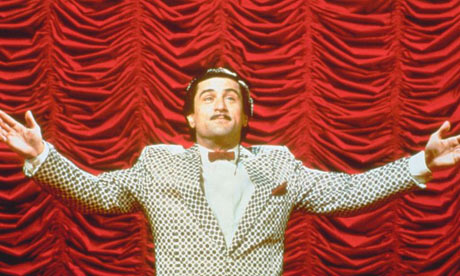
“But seriously, you should’ve seen my mother. She was wonderful. Blonde, beautiful, intelligent, alcoholic. Once they picked her up for speeding. They clocked her doing 55. All right, but in our garage?”
“The rich have got their channels in the bedrooms of the poor,” groaned Leonard Cohen not so long ago, decrying the way the powerful could cajole and pacify the masses when communications was in the hands of the few. But that was before the democratization of the media, before everyone had a channel or two hundred, before Survivors and Idols and Bachelors. Back when the playing field was still uneven and a lack of discernible talent was considered a detriment, there was a simple man named Rupert Pupkin who stormed the gates.
Pupkin (Robert De Niro), an obsessed, delusional fan of New York talk show host Jerry Langford (Jerry Lewis), lives in his mother’s basement and ekes out a tiny existence while dreaming big. He’s a peasant who sees himself as a king—the king of comedy, to be precise. Rupert hones stand-up material in his dank apartment during the night, chats with cardboard cut-outs of Liza and the like and works on one-liners. He spends the rest of the time with stalkerish autograph hound Marcia (Sandra Bernhard), who makes him seem relatively balanced by comparison.
An awkward meeting with Jerry leads Rupert to believe that he’ll soon be sharing couch space with the legendary host, but it only brings the aspiring comic rejection and humiliation. Desperate, Rupert schemes with Marcia to kidnap Jerry and keep him until he gets his ransom—the chance to do the monologue on Langford’s show. Will his moment in the spotlight transform Rupert’s life or only confirm his failure? After all, unfettered democracy guarantees neither greatness nor meritocracy, only opportunity.•
Tags: Jerry Lewis, Martin Scorsese, Robert De Niro
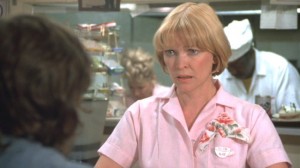
Burstyn, who won an Oscar for her role, years later said she thought the violent scenes went too far.
One of the films that Martin Scorsese made as a hired hand, Alice Doesn’t Live Here Anymore is the testosterone-fueled director’s surprisingly successful attempt at something resembling a feminist film, albeit one with the filmmaker’s trademark endless profanity and macho violence.
Housewife Alice Hyatt (Ellen Burstyn) lives in fear in small-town New Mexico, married to an irrational husband with a hair-trigger temper that could explode at any moment in the direction of her or her 11-year-old smartass son, Tommy (Alfred Lutter). Tragedy affords her a respite when her abusive spouse dies in an auto accident, but with little money and few skills, it’s not going to be easy to move her and her boy to Monterey, California, her childhood home which she still idealizes. She sings at piano bars and is game to wait tables, but those jobs won’t allow her to get rich quick.
Alice’s taste in men doesn’t help much, either. She hooks up almost immediately with a married psycho (Harvey Keitel), and is soon forced to flee from him to Tucson with tart-mouthed Tommy in tow. There she gets a job slinging hash at a diner and meets a nice guy (Kris Kristofferson)–or is he?–and hopes her luck may be changing. But because she was raised to be someone’s wife, Alice is always short on confidence. “I don’t know how to live without a man, that’s what it is,” she says, realizing the crux of her problem.
Because Alice dreams such small dreams, this movie feels a little dated even though it was true to its time for certain women. But there is so much richness here. Diane Ladd is just great as Alice’s foul-mouthed fellow waitress Flo, who has known as much unhappiness as Alice but treats bitter disappointment as yet another target for her big-hearted sass. Alice instinctively dislikes Flo at first, fearing that she can never carry herself with such gusto. But she comes to understand that boldness is less often something you’re born with than something you learn. (Available from Netflix and other outlets.)
More Film Posts:
- Strange, Small & Forgotten Films: Gates of Heaven. (1978)
- Classic DVD: Playtime. (1967)
- Strange, Small & Forgotten Films: Last Night. (1998)
- Classic DVD: The Gleaners and I. (2000)
- Classic DVD: Sherman’s March. (1986)
- Strange, Small & Forgotten Films: The Bothersome Man. (2004)
- Classic DVD: Picnic at Hanging Rock. (1975)
- Classic DVD: Thieves Like Us. (1974)
- Classic DVD: Brief Encounter. (1945)
- Strange, Small & Forgotten Films: Police Beat. (2004)
- Classic DVD: The Killing. (1956)
- Strange, Small & Forgotten Films: Confessions of a Superhero. (2004)
- New DVD: The Exploding Girl.
- Strange, Small & Forgotten Films: Hi, Mom! (1970)
- New DVD: Videocracy.
- New DVD: Afterschool.
- Strange, Small & Forgotten Films: Chan Is Missing. (1982)
- Strange, Small & Forgotten Films: Targets. (1968)
- Classic DVD: Logan’s Run. (1976)
- Strange, Small & Forgotten Films: The Silent Partner. (1978)
- Classic DVD: Head. (1968)
- New DVD: Bad Lieutenant: Port of Call New Orleans.
- Classic DVD: The Phantom of Liberty. (1974)
- Strange, Small & Forgotten Films: The Face of Another. (1966)
- Strange, Small & Forgotten Films: Blast of Silence. (1961)
- Strange, Small & Forgotten Films: Night Moves. (1975)
- New DVD: Greenberg.
- New DVD: Big Man Japan.
- Classic DVDs: Symbiopsychotaxiplasm Take One. (1968)
- Classic DVD: The Holy Mountain. (1973)
- Classic DVD: Beat the Devil. (1953)
- Strange, Small & Forgotten Films: All the Vermeers in New York. (1989)
- Classic DVD: “La Jetée.” (1962)
- New DVD: The T.A.M.I. Show.
- Strange, Small & Forgotten Films: Bad Company. (1972)
- Classic DVD: The Other. (1972)
- Strange, Small & Forgotten Films: The Naked Kiss. (1964)
- Strange, Small & Forgotten Films: “La Soufriere.” (1976)
- Classic DVD: Network. (1976)
Tags: Alfred Lutter, Ellen Burstyn, Harvey Keitel, Kris Kristofferson, Martin Scorsese
Marrying big-budget cinematography to a B-movie aesthetic, Martin Scorsese’s Shutter Island spectacularly captures the lush surface of a great psychological thriller, but sadly little of the essence. While the gorgeous compositions make for an impressive Hitchcock homage, the drama’s ultimately just a welter of not-so-interesting red herrings from a director who isn’t sure what he wants to accomplish and has saddled himself with a miscast lead actor in Leonardo DiCaprio.
The action revolves around DiCaprio’s U.S. Marshal Teddy Daniels, who travels in 1954 to a psychiatric hospital on the remote titular isle to investigate the disappearance of a patient. Before long, Daniels believes that the hospital’s omnipotent Dr. Cawley (Ben Kingsley) is trying to hide something–namely horrific medical experimentation on humans that may be inspired by Nazi procedures or connected to the House Un-American Activities Committee. But Daniels has long been under immense stress, as flashbacks to his wartime experiences and his murdered wife attest, and he’s not really sure which end is up. Is he really on to something sinister or is he imagining it all or is it something else?
Scorsese doesn’t seem to care if you figure out the answers halfway through the film; he’s too busy working with the immensely talented cinematographer Robert Richardson on fog and rain machines to fret much about the plotting, which is alternately intentionally and unintentionally confused.
DiCaprio, who is better at conveying temper (as in The Departed) than torment, simply lacks the haunted quality to pull off a part of this depth. He’s able to furrow his brow at will, but he has little to call on beneath his skin. This paucity is called into sharp relief during a scene in which he encounters a spectral imprisoned patient, played by Jackie Earle Haley, who may be incarcerated because he knows too much about Dr. Cawley’s unethical work. In a few minutes of screen time, Haley pours out a torrent of pain and persecution that neither Scorsese nor DiCaprio bring to the proceedings. They’re just approximating what they think things should look like, while Haley’s soul is on fire.
Because of his star’s name, Scorsese was able to get the money to make Shutter Island into a lavish work that ranks with Raging Bull, Goodfellas and Kundun in terms of visuals, but a small-budget movie with Haley in the lead would probably have been a far greater thing.
More Film posts:
- Strange, Small & Forgotten Films: The Naked Kiss (1964)
- Strange, Small & Forgotten Films: “La Soufriere.”(1976)
- New DVD: The Road.
- Classic DVD: Network. (1976)
- Top 20 Films of the Aughts.
- Strange, Small & Forgotten Films: Seconds. (1966)
- New DVD: Art & Copy.
- Strange, Small & Forgotten Films: The Honeymoon Killers. (1970)
- New DVD: Bad Lieutenant: Port of Call New Orleans.
- Strange, Small & Forgotten Films: Electra Glide in Blue. (1973)
- Strange, Small & Forgotten Films: Prime Cut. (1972)
Tags: Jackie Earle Haley, Leonardo DiCaprio, Martin Scorsese, Robert Richardson
The Honeymoon Killers could have been Martin Scorsese’s first great film. The then-fledgling director was hired to handle material that seems perfect in retrospect for his sensibilities: a grisly black-and-white docudrama about the real-life 1940s crime spree that saw a pair of grifters commit a string of increasingly brutal murders. The producers were unhappy about the pace of Scorsese’s shooting schedule and his association with the pic ended after just a week. What’s shocking is that novice screenwriter Leonard Kastle, who had no directorial experience, stepped into the breach and did a job even Scorsese could envy.
Suave Ray Fernandez (Tony Lo Bianco) is a con man who contacts lonely women across America through correspondence clubs and separates them from their savings. He meets his match, however, when he answers a letter from heavyset nurse Martha Beck (Shirley Stoler), who is so desperate for affection that she doesn’t think twice when she figures out the con. Pretty soon the pair are working the swindle together, letting their love fuel a spree that grows more brutal and murderous with every new victim.
Apart from loneliness and greed, there isn’t a great deal of psychological insight into the vicious crimes, but Lo Bianco and Stoler do so much with surface emotion that the movie never stops being disturbing and oddly touching. For the role, Lo Bianco affected a voice that occasionally sounds like a stock Dracula accent. He and his love draw blood from their victims, to the film’s Mahler score, like they’ll never drink their fill. (Available via Netflix and other outlets.)
More Film posts:
- Strange, Small & Forgotten Films: Seconds. (1966)
- New DVD: Bad Lieutenant: Port of Call New Orleans.
- Strange, Small & Forgotten Films: Electra Glide in Blue. (1973)
- New DVD: The Informant!
- Strange, Small & Forgotten Films: Prime Cut. (1972)
- New DVD: Beeswax.
Tags: Leonard Kastle, Martin Scorsese, Shirley Stoler, Tony Lo Bianco

